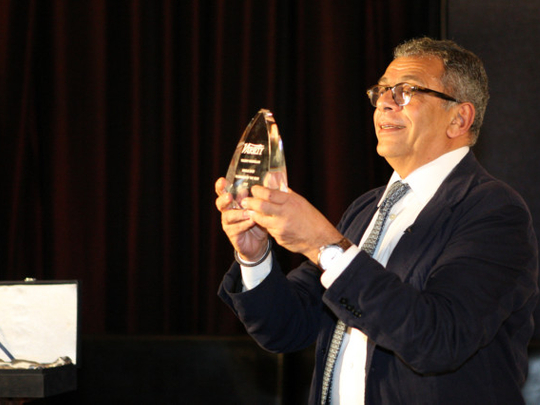
Yousry Nasrallah is unconventional in life as well as in film.
Rather than the standard black suit, white shirt, leather shoes and skinny tie, the Egyptian filmmaker went for a more casual look as he picked up an award for Filmmaker of The Year at the Abu Dhabi Film Festival.
It gets better — and how refreshing — as he chose to credit the actors and actresses of his movies entirely.
“They make my films what they are,” he said looking back at a small contingent, who had come to support him. “They are wonderful, wonderful actors and people. They are friends too.”
The Variety award for Filmmaker of The Year was handed was presented by the industry publication’s Jay Weissberg at a VIP ceremony at Etoiles in Emirates Palace.
In a touching statement Weissberg, having first thanked the festival for their support of Arab cinema, made reference to a statement Hollywood actress Susan Sarandon said a few years ago.
“A few years ago she said “all films are political, they either support the status quo or they reject it.” In Yousry’s case this has a special meaning. Many people who are looking to finance films are looking for films which are going to support their own opinions about what’s happening in their own region. Yousry has rejected that model in a very exciting and brave way. He makes films that are subtle, he makes films which are complex. He refuses to accept a particular point of view as being the absolute point of view. We need more film like this, we need more films from Yousry.”
In response, a quick-witted Nasrallah quipped he was “very sad” when asked how he felt about accepting such an award. “No, what Jay said actually makes me quite happy in the sense that being awarded for not being conventional for going with the current, yet still being a good filmmaker, I think this is very, very flattering, very, very rewarding.”
Nasrallah’s latest movie After the Battle (Baad Al Mawkeaa) is a 2012 Egyptian drama film written by Omar Shama and competed for the Palme d’Or at the 2012 Cannes Film Festival.
Inspired by the events of the Egyptian revolution, and one of the few fictional films which surfaced as a result, Nasrallah said he “had no choice” but to make this movie.
“I had signed a contract for a film before the revolution and I said “I can’t do that film. I loved the script and I’ll probably do it as my next film but after the revolution our thoughts were so much taken by what was happening outside I said to myself “why transform reality into an enemy when I can make it a friend?” instead of being against the film I wanted to use it’s energy. I talked to the actors and they were enthusiastic, went to the producers and they said go ahead, I couldn’t believe it. I knew that if everybody was so enthusiastic there had to be something good enough and crazy enough about it so I thought, let’s go ahead.”
Born in Cairo in 1952, after studying economics and political science, he went to live in Lebanon where he became a journalist. His career in film started in 1980 as assistant to Volker Schlöndorff on Die Fälschung and to Youssef Chahine on Al-Dhakira and Adieu Bonaparte which he also co-wrote.
Nasrallah says his bravery in film came from within and wasn’t something he was even aware he possessed.
“It came from the first film when I thought I was doing a very normal film in a sense but found myself being refused by all the producers by all the actors and I just made it with friends with very little money and it went to Cannes. I said “wow, it works. Being obstinate works”.
Best known for films including Summer Thefts, Alexandria Again and Forever, On Boys, Girls and the Veil and Al Medina, which was awarded the Special Jury Prize in Locarno Film Festival in 1999, Nasrallah added it hasn’t always been easy but has enjoyed the ride.
“There have been all kinds of barriers. Working with very little money. But at the same time it was very liberating because once you put yourself in a position where you tell yourself as a director that the most important thing is to create a context within which he or she can work freely, that’s 80 per cent of a director’s work, work freely to make his vision come true, I think this has been the struggle and I’ve been quite successful at that and I expect it to go on.”
For more information about ADFF visit abudhabifilmfestival.ae











